#Aum Shinrikyo
Text
Interview with Nakayama Hisashi, former member of Hikari no Wa (Aum Shinrikyo branch)
cw: cults, domestic violence, sexual manipulation, conspiracy theories, verbal abuse
Do not harass anyone mentioned here. I'm only citing Mr. Nakayama's name and website because he let me do so.
Do not tag as true crime
Originally posted on Reddit by me
Matryoshka dolls are a well-known symbol of Russian arts and crafts; a majestic doll that, by the hands of others, is forced to reveal itself smaller and smaller until, finally, its tiny, hollow interior becomes visible.
Though they have dozens of tales attached to their creation and meaning, none of it is grounded on reality: these dolls were invented pretty recently with fully comercial purposes. Matryoshka aren't exactly meaningful for their land's mythology, nor original. But at least they're cute and saleable.
So is Fumihiro Joyu, ex-spokesman and executive of Aum Shinrikyo.
Joyu is the kind of person who will never run out of stories to tell about; graduated from Waseda University, one of Japan's most prestigious institutes to this day, he quickly lost interest on the labour market and used his knowledges in a new, weird yoga classroom, which would later become the infamous Aum Shinrikyo. And Aum surely got Joyu busy; he served as a spokesman, public relations representative, head of Aum's russian branch and almost as one of its men of action: in 1993, he attempted to spread anthrax in Kameido, Tokyo. It failed miserably.
But he only became infamous in 1995, when he defended the cult against allegations that they were responsible for the subway sarin attack at all costs. His devotion didn't earn him any prestige, just a lot of fans willing to steal and auction off his dirty socks and a saying attached to his name: ああいえば上祐 (Aa ie ba Joyu, which roughly translates to "If you say so, Joyu"). After being sentenced to three years of prison in late 1995 due to charges of perjury and forgery of private documents, he declared that "Master Asahara is a guide, a savior, and everything to me". It seemed unlikely that his adoration would be shaken.
But after being released from prison in 1999, it seemed that Joyu had a change of heart. He didn't leave Aum (in fact, Joyu became its De Facto representative under the name Aleph), but tried to reform it, reflect on its multiple incidents and eliminate Asahara Shoko's influence. In 2007, after a series of conflicts with Asahara's wife, children, and other executives, Joyu announced he was going to leave Aleph and launch a new organization: Hikari no Wa. According to its website:
Hikari no Wa is not a religion. This is a classroom where you can learn the wisdom and philosophy of happiness from the East and the West, including Buddhist thoughts, meditation methods, and modern psychology, without believing in a specific guru, god, or sect.
The classroom, of course, was met with protests and doubts. The U.S Department of State only lifted its designation as a terrorist foreign organization (TFO) as late as 2022, and Japanese police still surveils it.
Since then, despite still being considered a controversial figure, Joyu has made attempts to clear his image; according to Hikari no Wa's website, the classroom pays compensation to the victims of the subway sarin attack, deprogramms Aleph believers and apologises for its representative's former criminal activities. Joyu also seems to have invested in unusual methods of self-promotion, such as taking part in a hiphop EP where he sings while an edit of the 1995 subway attack plays in the background. He also published a book on how to identify dangerous cults despite his status as a potential cult leader.
There is very little information about Hikari no Wa in English. Its only known activities are events and speeches about spirituality held by Joyu himself, its alleged "Aum liquidation" and its "Pilgrimage to Sacred Places".
However, around February 2024, I stumbled upon a fairly obscure site: stop-hikarinowa.com. According to itself, its purpose is to:
Ask Hikari no Wa to disband.
Promote the exchange of information and people-to-people exchanges on the issue of Hikari no Wa.
Provide support for Hikari no Wa members to withdraw from membership.
Disseminate information to society about the problems of Hikari no Wa.
In addition, we will carry out all activities that we deem necessary for issues related to Hikari no Wa and Aum Shinrikyo.
It also claims Hikari no Wa is, in fact, a cult:
Just like Asahara in Aum Shinrikyo, I think it boils down to the fact that Joyu is in control of everything in Hikari no Wa.
It's true that Hikari no Wa changed its doctrine because it wanted to get rid of probation, and it also said that it was a philosophy and thought class.
All of the reforms that have been carried out over the past 10 years have been carried out at the discretion of Joyu. This fact proves that it is possible to return to the doctrines and operations of the past with the sole intention of Joyu.
As long as he's under inspection, he can't do anything as crazy as Aum (and this is the same for Aleph), but if it were to be removed, no one would be able to stop him from running wild like he did with Aum.
The guru becoming a dictator is common to other cults, but if a cult that has crossed the line in the past is allowed to go unchecked, it will be a different danger than other cults.
The danger of Hikari no Wa varies greatly depending on what happens to the government's surveillance, but at least it seems that it is an organization that cannot guarantee even safety without national surveillance.
* On "Frequently Asked Questions"
I contacted its representative, Nakayama Hisashi who's both a former Aum believer (from 1996 to 2007) and a Hikari no Wa one (from 2007 to 2016) and managed to interview him on March 30, 2024.
The interview go as follows:
Q: Tell us about yourself. You joined Aum to find out more about its practices, but what made you stay for such a long time?
A: It was cosy. Aum believers are serious and selfless, so it was really healing to talk to such people.
Q: From what I have read, despite precarious living conditions, including poor diet and cockroach-infested flats, Aum believers formed a strong sense of community. What was daily life like when you joined the organisation?
A: Food was considered a bother, and the idea was that it was good if you could get the minimum amount of energy. Even cockroaches were souls that were trying their best to live, and we looked after them with compassion. Such different values from the world were fresh and a strong sense of community existed. It was a similar life in Aum and in Aleph. In Hikari no Wa we secularised, so the ordained people remained Aum, but they disliked the filthy environment.
Q: When did you first come into contact with Joyu? What was your first impression of him?
A: Around 2005. My first impression was that he was a hard-working practitioner.
Q: Were you aware that he was at odds with the Asahara family? Were there any tensions within Aum in the late 2000s?
A: Initially I did not know that there was a conflict. Inside Aum, the explanation was that Joyu was in training, so I didn't think there was a conflict. Believers like me were not informed of anything. When Joyu came out of prison and the Group Regulation Law was passed, believers though Aum was going to be destroyed, so there was a sense of tension, and although there were people who opposed Joyu's methods, none of us thought that there would be a split later on.
Q: When Hikari no Wa was formed in 2007, why did you join it instead of staying with Aleph? What convinced you?
A: Because they sympathised with the idea of social reconciliation by acknowledging the incident. And I was banned from Aleph for having contact with Joyu.
Q: What were the first days of Hikari no Wa like? I have seen a video from around 2009[1], and it seems that many people protested its existence.
A: Hikari no Wa was not trusted at all, even if they said they were reflecting on Aum. I thought that if I reflected sincerely, society would one day understand me. Perhaps it was only the believers who were deceived by Joyu's words that he had reflected on his life.
Q: What was your daily life like? Did you go to work or interact with normal society? Did you talk to family and friends?
A: I moved from one job to another and worked on construction sites for a long time. I told my family about it, but my wife was vehemently against it, so I didn't talk much about being a believer. Once I mentioned that I was a member at work, but I was discriminated against so quit my job. Since then, I stopped talking about Hikari no Wa to my friends. But I did have normal social interactions outside of the classroom.
Q: I assume you are familiar with the B.I.T.E model, which lists cult behaviour. Let's use it to ask some questions. To what extent was your personal life regulated by Hikari no Wa? Was your diet, social or sex life regulated by the cult, or did you need permission to make major decisions?
A: I was a noisy believer [laughs], so I was never dominated by the cult. But they were giving detailed instructions to other people on how to spend their money. I would immediately announce it on social media, so I guess the cult was also cautious. It seems that I was treated differently from the others.
Q: I watched some videos from Hikari no Wa's Youtube channel[2] and they seem to travel frequently. At the same time, they pay compensation to Aum victims. I wonder if a tremendous amount of money is being taken from its believers, or if Joyu is making money in other ways.
A: The pilgrimages are a means of collecting large sums of money from believers. Devotees are desperate to join in (laughs). "Why is it so expensive?" I asked him, and he excused himself by saying, "Because I'm compensating them". Compensation is the excuse for the high participation fees. But we couldn't operate on that alone, so some of our staff went out to work, and I think we took a lot of money from the rich and quiet believers.
Q: Hikari no Wa page claims to be a place to learn psychology and natural doctrine, without any religious elements. Is this true? Joyu is not licensed to talk about psychology, and he seems to be getting increasedly incoherent.
A: I was confused too. In the classroom, I was reading sutras and doing zazen[3]. And then they said, "It's not a religion", so I thought they were deceiving the world. I think that Joyu himself probably doesn't know what he is doing anymore (laughs).
Q: I saw you accuse Joyu of still being an Aum believer and simply hiding Asahara. Can you elaborate on that?
A: When I left Aleph, Joyu said to me: 'I will surely share my reincarnation with the Venerable Master (Asahara). So if you follow me, you will surely meet the Venerable Master again." In other words, following Joyu means that no matter how much you deny Asahara, you are recognised in the doctrine of Aum. Joyu still does not deny reincarnation; if there is reincarnation, then Joyu and Asahara will meet again, and people who are closely related to Joyu will meet Asahara again. The only way to deny this is to deny reincarnation or to dissolve the organisation and live modestly. Because of this idea, everything that Joyu says and does to get people to recognise him is to hide Asahara. There's no retraction or apology to his followers for what he said at that time. I don't think he is remorseful at all.
Q: Wait, that's big! Do you have evidence?
A: It was just my experience because it was in a private conversation. I've told the public security authorities and I also think it's evidence for the renewal of my observation, but it's just my testimony, I don't think it's evidence.
Q: That is unfortunate, but I still think it stands out. From reading various discussions of yours, it seems that there is sexual manipulation going on within Hikari no Wa. Can you tell us a bit more about it?" I saw terms such as "sexy business".
A: It's a technique known in Japan as 'shirokoi business'. In Aum, love was also an affliction, but having romantic feelings for the Venerable Master (Asahara) was considered a good thing. Intense romantic feelings of wanting to be recognised by the Master and to keep him to oneself were considered to be a form of faith. Joyu frequently appeared in the media during the Aum Affair, which gave rise to a group of fans called "Joyu Gals". Such Joyu fans started coming to Hikari no Wa. Not only 90s Joyu fans, but also new fans are still coming to Hikari no Wa through YouTube and events. They are taking money by cleverly utilising such fan psychology and romantic feelings. The method is to stimulate women's romantic feelings and dominate them by saying, for example, "I have a connection with you from the past". In Japan, there are 'host clubs' where men entertain women, and the sales method is similar to this. Although there was only one victim, I was consulted by a victim who said she actually had sexual relations with Joyu. But at the strong request of the victim, we don't really take it up.
Q: I have also read that Joyu is prone to domestic violence, please elaborate on this.
A: Joyu has a strong desire for control, so he would yell at staff and others when he didn't like something, and sometimes beat them up. When I asked someone who was actually hit, he said that he had his karma taken away (laughs). I think this is a typical example of Aum thinking, which is pro-violence. I criticised him a lot, so I don't think he does violence now, but I think he still uses words to corner his opponents. Joyu has a male-dominated mindset, so his desire for domination over women is particularly strong, and I think it tends to lead to violence.
Q: Have you witnessed physical or verbal violence? or have you been subjected to violence? Again, there is no intention to invade your privacy. If you do not wish to answer, you do not have to.
A: I have never been hit directly. However, when I quit, I was verbally abused. I saw him shouting at staff on many occasions. Old believers know this all too well. He didn't have any anger control at all (laughs).
Q: Why did you start to leave Hikari no Wa? Did other members also quit?
A: I loved Hikari no Wa, not Joyu, so I wanted society to be a comfortable and secure place for the followers who gathered there. In reality, however, the believers were only paying money and being used. I wanted to reform that, but I couldn't do it and was forced to quit. I was also exhausted, so it was probably just as well. There were more than 100 staff members at the time of the Aleph Joyu Faction, but by the time Hikari no Wa was established, there were only about 60, and now there are less than 10. Those who had survived Aum and Aleph gave up on the Joyu and quit. Originally, Aum was a cult with two sides of the same coin, and only those close to them would have known the true nature of the guru, but as it became smaller and smaller, I think the number one reason is that the true nature of Joyu could not be hidden and came to the surface (laughs). The same is true of Aleph, as the closer to Asahara you were, the less you remain in Aleph. The only people left in Aleph now are people who don't know Asahara directly. The same is true of Hikari no Wa, who fled as they learnt about Joyu's character. People who found out that he was the king of the naked left. Conversely, the staff who remain now are people who don't want to admit that Joyu is naked, so they may no longer run away. It's pitiful.
It's important to note that, in July 11th 2018, it was revealed Joyu witnessed the murder of a female believer[4] back in 1991, though he didn't say anything until he could no longer be charged for it, and he still avoids this topic. Nakayama says:
After I left, it was revealed after Asahara's execution that Joyu had left female followers to die during his Aum days and had been covering it up for a long time.
When I found out about the incident, all the slight remaining feelings I had for Joyu were gone.
I thought that everything I had been working on with hope, saying that I would reflect on the incident, was a lie. I now seriously hope that the cult will be disbanded.
Moving on.
Q: Sorry to digress, but I was very interested in Hikari no Wa's instance on science. Joyu often talks about psychology, even if he's not licensed to talk about it. And he apparently gathered at events without masks during the pandemic.
A: Right. What the Joyu says publicly, he says it with an awareness of what society will think of him. He pretends to be a sensible person. But in his true feelings, he thinks completely differently, and what he says and what he does are completely different. If you look at what he does, not what he says, you can see what he really thinks.
Q: Sorry to be too straightforward, but is Joyu a conspiracy theorist? I'm not talking about extreme and flash cases like Qanon. It's about things like "this disease can be cured with X, Y and W"
A: He has not been vaccinated. This may be because he believes that vaccines are not desirable from a parrot doctrinal point of view and that if he practices, he will not get infected. I don't want to call it a conspiracy theory, but I think he thinks that practising is a better way to fight infection than vaccines or medicine.
Q: That's bad. Do believers have the freedom or critical skills to get themselves vaccinated?
A: It might be different for different people. Maybe many people think the same way as Joyu. That is, that practice is more effective than medical treatment. If Joyu would be asked by his followers, he would not deny the vaccine, but he would not dare to recommend it either. Since many people are dependent, I think many of them would not take the vaccine themselves if Joyu had not taken it.
Q: Sorry to change the subject again, but there is one more thing I wanted to know. I browsed through some of the accounts and posts and found screenshots of Joyu himself talking about and endorsing Vajrayana[5]. One of them was yours[6]. Is it authentic?
A: I always think about the risk of a court case when I send out screenshots, so I don't fake it. Hikari no Wa always say it'll go to court and then ask me to delete it.
And, then, the interview ended. I had more to ask, but it was 3 AM and I didn't want to waste more of Mr. Nakayama's time.
It's important to note that all of this is simply alleged and I'm solely giving voice to a former member. Joyu has still a large platform, with around 17k followers on Twitter, and appears on documentaries and interviews as an cult expert of some sorts. It's not uncommon for former cult members to study about it later on, but Joyu didn't go through any deprogramming initiative, not even during his time in prison. And, of course, it's certainly unusual for an ex-believer to establish a "non religious' (though with holy pilgrimages) and "non guru centered" (though he's the only member with an online presence) organization.
Do not track and harass former Aum/Hikari no Wa members. Mr. Nakayama gave me permission to say his actual name and site, but this experience has been traumatic to many people.
During my research, I found a quote associated with Joyu in some foruns and websites, but couldn't find any proof it was actually his nor the context in which it was supposedly said.
A snake that doesn't shed its skin will die
Matryoshka are self aware, I guess.
14 notes
·
View notes
Text
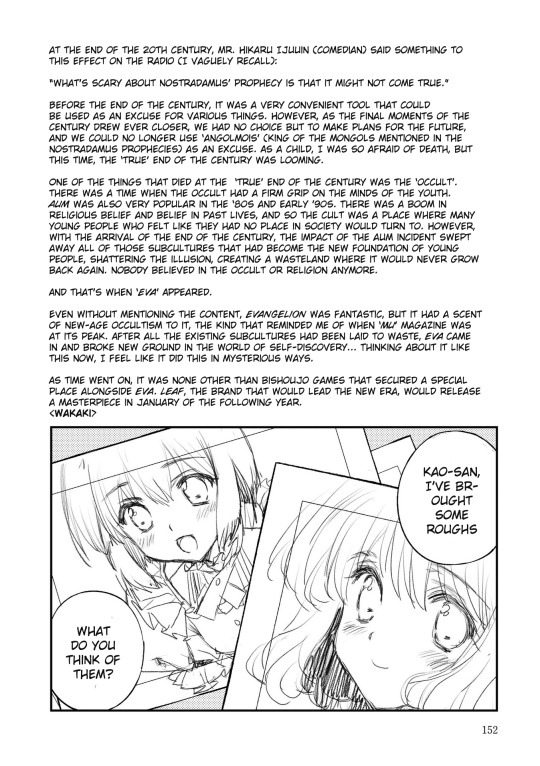
Tokyo subway sarin attack (the "Aum Incident"): March 20, 1995
Neon Genesis Evangelion premiere: October 4, 1995
Further changes to the plot were made following the Aum Shinrikyo sect's sarin gas attack on the Tokyo subway in March. Azuma Hiroki has said that the original Evangelion story was "too close to reality" from Anno's point of view. Anno thought that the original scenario was not suitable for broadcasting, and he feared censorship. However, he also criticized Aum Shinrikyo, because "they lost any contact with reality". For this reason, Azuma stated that Evangelion "is an intrinsic critique of Aum". (From Wikipedia)
(Image source: 16bit Sensation)
18 notes
·
View notes
Text
Does anyone know any good documentaries or podcasts about aum shinrikyo? I’m looking for something accurate and non-sensationalist over something entertaining or shocking that attracted a large pop audience, just want to make that clear.
#my partner wanted to watch some stuff about it#I’ve read books on the subject but I don’t want to have to actively watch for corrections#and there’s so much sensationalist stuff about Aum going around out there#japanese history#cults#aum shinrikyo
5 notes
·
View notes
Text
Iyami being a terrorist and justifying murder👍
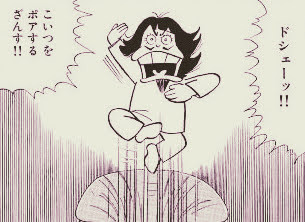
#this is canon and a reference to Aum Shinrikyo#love this#iyami#iyami zansu#aum shinrikyo#osomatsu san#miiuu studies
8 notes
·
View notes
Text
2018-Shoko Asahara
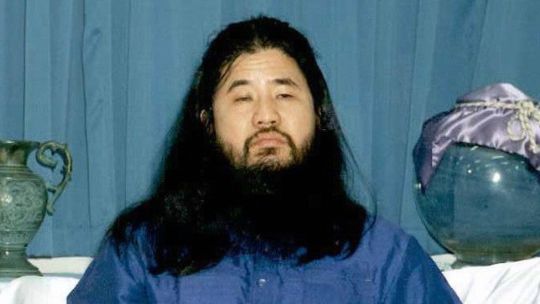
Shoko Asahara (麻原 彰晃, Asahara Shōkō, March 2, 1955 – July 6, 2018), born Chizuo Matsumoto (松本 智津夫, Matsumoto Chizuo), was the founder and leader of the Japanese doomsday cult known as Aum Shinrikyo. He was convicted of masterminding the deadly 1995 sarin gas attack on the Tokyo subway, and was also involved in several other crimes. Asahara was sentenced to death in 2004, and his final appeal failed in 2011. In June 2012, his execution was postponed due to further arrests of Aum members.[2] He was ultimately executed along with other senior members of Aum Shinrikyo on July 6, 2018.[3][4]
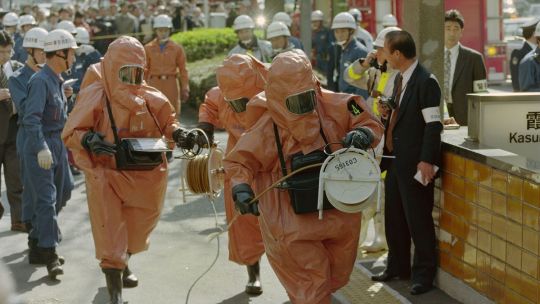
On March 20, 1995, members of Aum Shinrikyo attacked the Tokyo subway with the nerve agent sarin. Thirteen people died and thousands more suffered ill effects. After finding sufficient evidence, authorities accused Aum Shinrikyo of complicity in the attack, as well as in a number of smaller-scale incidents. Dozens of disciples were arrested, Aum's facilities were raided, and the court issued an order for Asahara's arrest.[29][30] In the following months, a general attitude to perceive new religions and cults as a potential danger for the whole society spread among the Japanese people.[31]
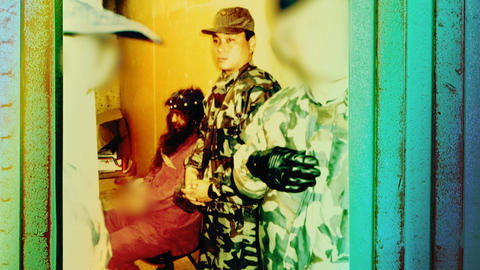
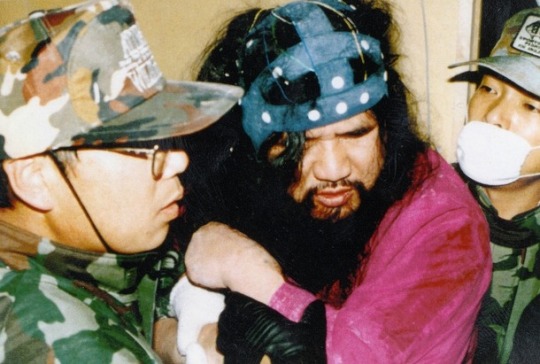
On May 16, 1995, the police investigated the headquarters of Aum Shinrikyo. Asahara was discovered in a very small, isolated room in one of the facilities. Wary of possible Aum military power, the First Airborne Brigade of the Japan Ground Self-Defense Force was stationed nearby to support the police if needed.
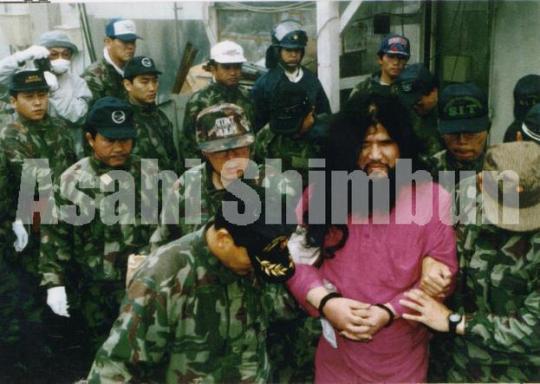
Asahara was executed by hanging at the Tokyo Detention House on July 6, 2018, 23 years after the sarin gas attack, along with six other cult members.[3][4][46] Relatives of victims said they approved the execution.[47] Asahara's final words, as reported by officials, assigned his remains to his fourth daughter, who was unsympathetic to the cult and stated she planned to dispose of the ashes at sea; this was contested by Asahara's wife, third daughter, and other family members, who were suspected of wanting to enshrine the ashes where believers can honor them. As of March 2020, the ashes were still at the Tokyo Detention House.
6 notes
·
View notes
Text


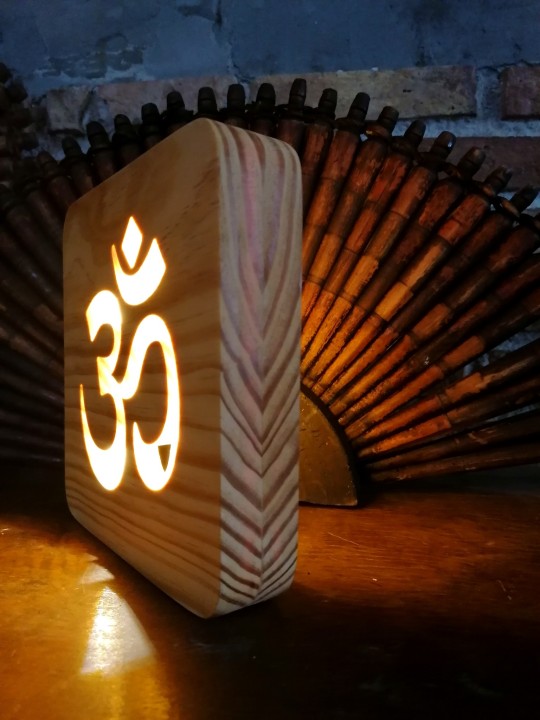
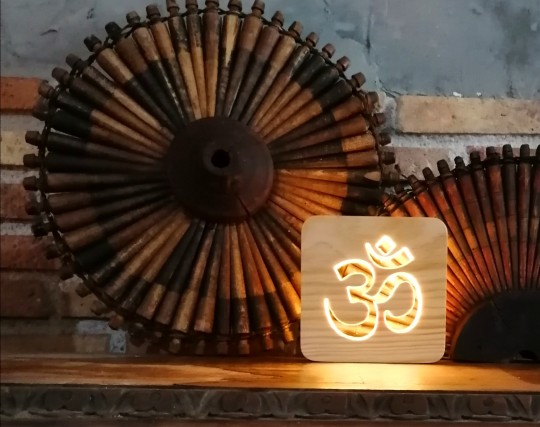

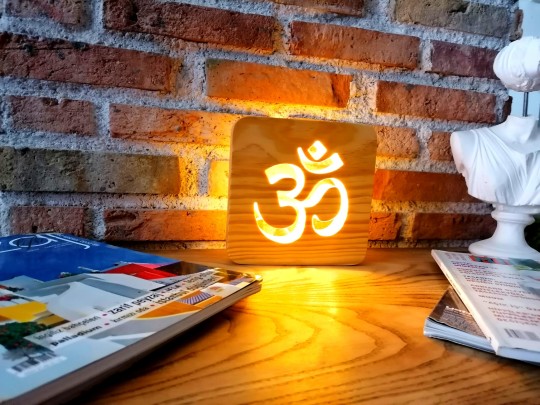
12 notes
·
View notes
Text
Dokkoi Daisaku (Taro Yamada) TV drama theme song
youtube
At the end of the 20th century, Aum Shinrikyo's guru, Shoko Asahara, who shook the world, used the false word "poa" to justify the killing of those who were enemies of the cult. "If you poa, you can reincarnate your enemy into a higher religious position in the next life," he explained condescendingly. This TV drama portrays a world where such pseudo-religion does not work at all, and the world is a battle of strength with only one body. fresh. You only live once. How many times you live on the earth? Live that one time to the fullest. It was a boy's vocational training story.
どっこい大作(山田太郎) テレビドラマテーマソング
20世紀末、世界を震撼させたオウム真理教の教祖:麻原彰晃は、「ポア」なんて虚言を用い、教団にとって敵である人物を殺害することを正当化した。「ポアしてあげれば、敵を来世、より高度な宗教的地位に生まれ変わらせてあげられる」と、恩着せがましく説明した。そんな似非宗教がまったく通用しない、裸一貫、実力勝負の世界をこのテレビドラマは描く。清々しい。人生は一回のみ。何度もあるものか。その一回だけを精一杯生きるのだ。少年の職業修行物語だった。
#Dokkoi Daisaku#Taro Yamada#Babylman#TV drama theme song#Aum Shinrikyo#poa#Shoko Asahara#You only live once#fresh#a boy's vocational training story#Youtube
2 notes
·
View notes
Text
Now, nobody's saying that Aum Shinrikyo also conducted a nuclear bomb test at Banjawarn Station, but there was a loud noise in late May 1993, and there was a bright flash at the same time, and there is mineable uranium in exactly the same area, and the cult's psychotic leader was completely and utterly obsessed with building a nuclear bomb.
"Zealot: A Book About Cults" - Jo Thornely
#book quotes#zealot#nonfiction#banjawarn station#western australia#australian outback#sheep station#cattle station#aum shinrikyo#shoko asahara#cult#nuclear bomb#nuclear testing#uranium mining#1990s#90s#20th century
7 notes
·
View notes
Text
Five most evil brainwashing cults
Five evil brainwashing cults are examined by TV historian Tony McMahon including the Branch Davidians and Heaven's Gate
The 1970s 1980s, and 1990s saw some terrifying brainwashing cults emerge resulting in mass murder and suicide. In November 1978, the bodies of over 900 men, women, and children were found at a remote site in Guyana. The Jonestown mass suicide was on a scale not seen since a similar number of Jewish zealots took their own lives at the fortress of Masada, rather than be captured by the Romans in 73…

View On WordPress
#70s#80s#Aum Shinrikyo#Beat Takeshi#Ben Roden#Branch Davidians#David Koresh#Davidians#evil brainwashing cults#Halle-Bop UFO#Heaven&039;s Gate#Jim Jones#Jonestown Guyana#Jonestown Jim Jones#Joseph di Mambro#Kool Aid#Luc Jouret#Marshall Applewhite#Nichele Nicholls#People&039;s Temple#Rosicrucian#Shoko Asahara#Solar Temple#Takeshi Aum#Victor Houteff#Waco siege
3 notes
·
View notes
Photo
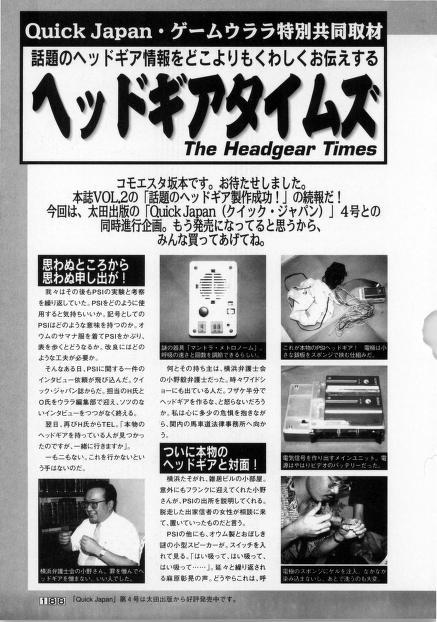
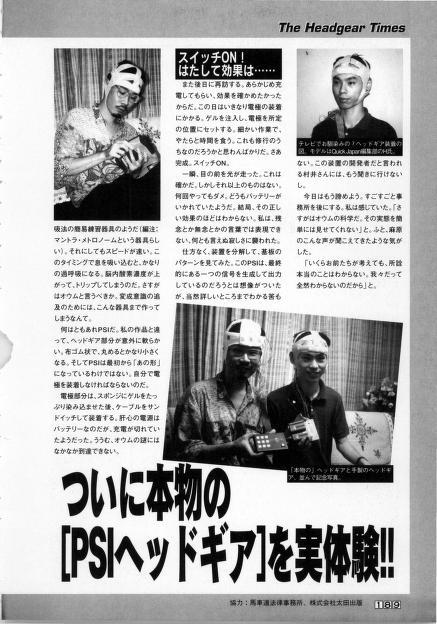
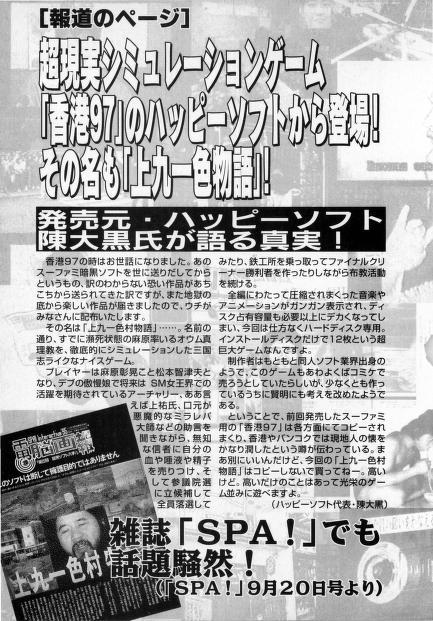
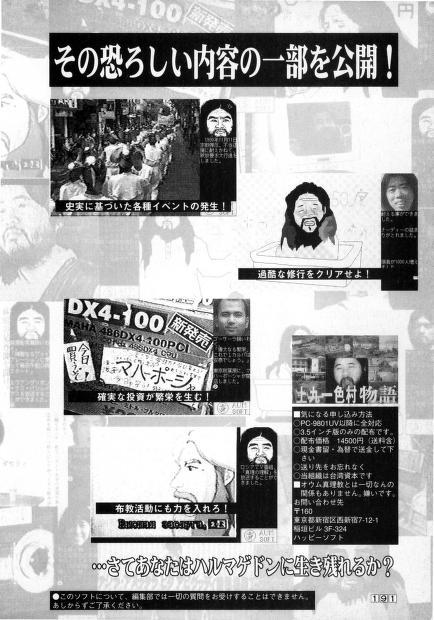
Scans of pages from Game Urara vol. 4
Page 188-189: An article satirising Aum Shinrikyo’s PSI headgear.
Perfect Salvation Initiation (PSI): An initiation ritual in which the user wore a headgear device which passed a weak electrical current to the head. Shaped like a helmet and lined with electrodes touching the scalp, the PSI claimed to synchronise Asahara’s brainwaves with the initiand’s.
Page 190-191: An advertisement for the PC-98 Aum Shinrikyo game: The Story of Kamikuishiki Village (上九一色村物語, Kamikuishiki-mura Monogatari) developed by HappySoft - the same company that developed the equally disturbed Hong Kong 97.
For anyone curious as to whatever is being said about the game can find a complete translation of the page here.
sources: https://archive.org/details/gameurara
https://www.vice.com/en/article/vb5k7a/the-true-secret-history-of-the-creepiest-cult-game-ever-made
https://www.gamingalexandria.com/
Ushiyama, Rin, 'Appendix: Glossary of Terms', Aum Shinrikyo and religious terrorism in Japanese collective memory (London, 2022; online edn, British Academy Scholarship Online, 19 Jan. 2023), https://doi.org/10.5871/bacad/9780197267370.005.0001
2 notes
·
View notes
Text
Music of Religious Cults
vimeo
Music Made By Religious Cults
YouTube Playlist: Cult Music
Spotify Playlist: Cults & The Cultic Milieu
#true crime#criminal investigations#crime after crime#Cults#religious cults#cult music#occult#sect#Spotify#Manson family#source family#aum shinrikyo#raelism#serial killers#movement of the restoration of the Ten Commandments of god#children of god#yahowa#Vimeo
5 notes
·
View notes
Text
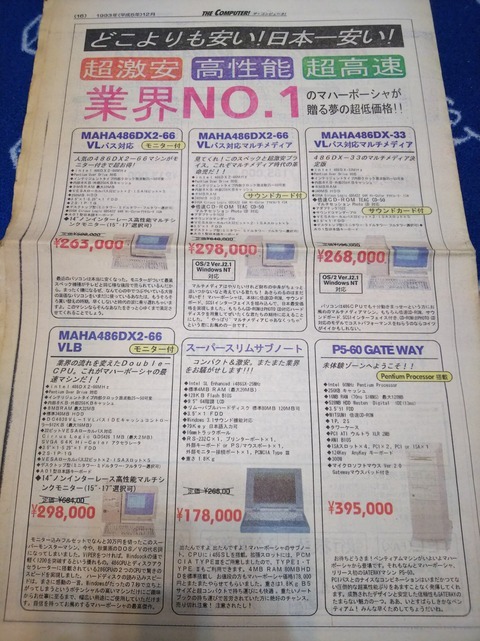
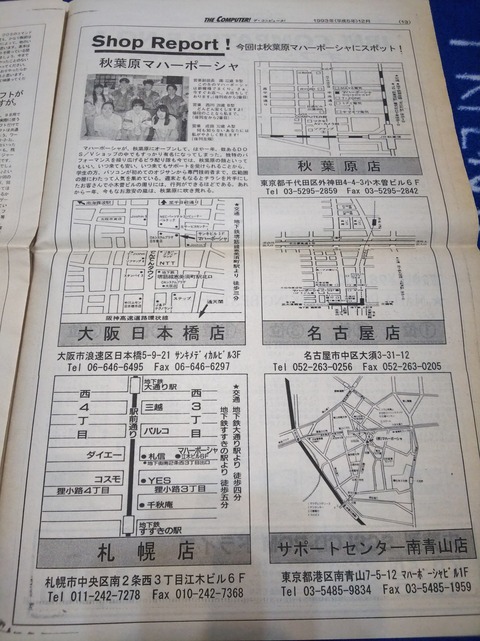
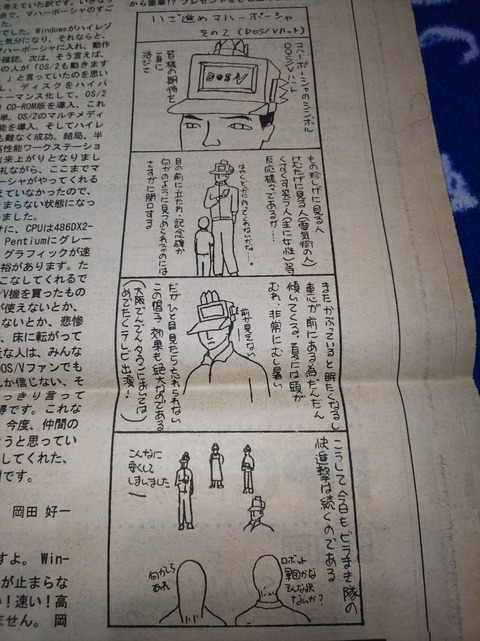
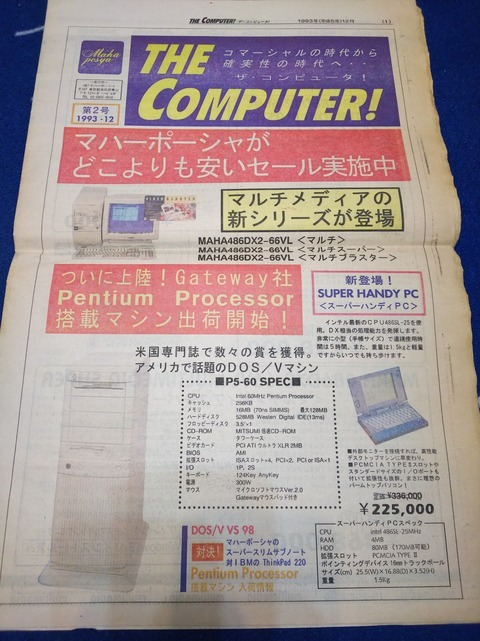
c. 1993 Mahaporsha (Aum Shinrikyo's tech side business) ad. It was very popular among young people in Akihabara due do its cheap prices. Its stores allegedly had mantras written on its walls.
taken from this 2023 discussion thread
#archive#aum shinrikyo#vintage ads#90s japan#there's a scary amount of rare media in these image boards
4 notes
·
View notes
Text

Undated photo of Japanese cult leader Shoko Asahara “levitating”
#history#vintage#shoko asahara#levitation#japan#japanese#cult leader#reddit#link#social media#portrait#photo#photography#color photography#japanese history#cult history#cult#aum shinrikyo#r/interestingasfuck
5 notes
·
View notes
Text
2022/09/28 English
Recently I have been reading Haruki Murakami's works intensively. Today I went to Aeon as usual, as an activity in the morning, and started reading "Underground" there. This is a common thing but I thought that "Underground" tells us the real faces of the people caught in the Tokyo subway sarin attack. There are various people's days, and also their lives. Those have a certain value to be treated preciously. Then, once I had underrated those kinds of 'ordinary lives'. I must treat 'to live ordinarily' as junk.
To live ordinarily... Me, I am 47 years old but just staying single and have no family, no kids. Yes, I am the person who chooses this way of living. Probably ordinary workers might endure a hard time accessing the workplace by some trains such as the "Underground" tells, They might do their work facing that stressful situation. I just ran away from the possibility of living that kind of life (even if it was unconsciously). And I chose the life which has time to read my favorite books and music. I just understand that it's not the problem that has a correct answer. Then, I need to accept other people's ways of living as 'it is what it is'.
I have been vaccinated for the fourth time. I already made preparation for being vaccinated as a veteran. Just got, and wait for 15 minutes, and all over. I pray that the vaccine would sink into my body smoothly. This evening, I read Haruki Murakami's "A Wild Sheep Chase". Haruki Murakami tries to tell his story seriously in this story. Before this, his novels consisted of fragments mainly, so I felt that they were a collection of pieces of the story, not the smooth and long story itself. But this novel ends as a well-made story that has long and smooth sentences. I felt that he had gotten evolved as a writer simply.
Thinking about what Haruki's novel should be next, I chose his "Hard-Boiled Wonderland and the End of the World". The reason why I have been attracted by Haruki is just his storytelling is great. Indeed, if you choose any 'well-made' story like Haruki's, you can find Raymond Chandler or Toshihiko Yahagi, and also so many writers. But Haruki's novels have a 'fishy' taste like a great conspiracy. I might even say that you can sink into his paranoiac point of view which this world itself must be controlled by an evil group. Therefore young readers are into his works I guess.
2 notes
·
View notes
Text
Japanese Cults
Cults, have been present in Japan for decades. Some of these groups have been controversial due to their beliefs and practices, and have been accused of engaging in criminal activities.
One of the most infamous cults in Japan is Aum Shinrikyo, which was responsible for the 1995 Tokyo subway sarin attack that killed 13 people and injured thousands. The group was founded in the 1980s by Shoko…
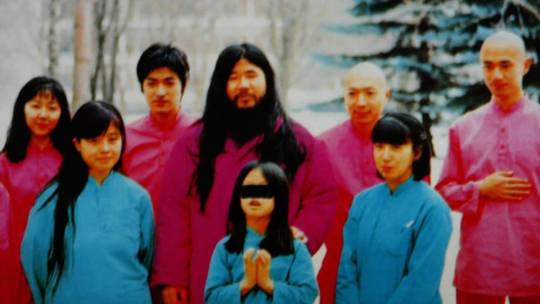
View On WordPress
0 notes
Text
2018-Aum Shinrikyo members executed on July 6
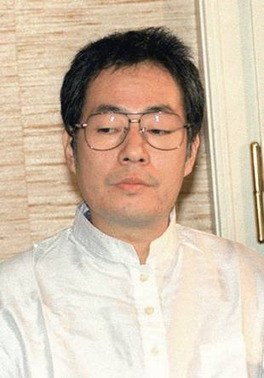
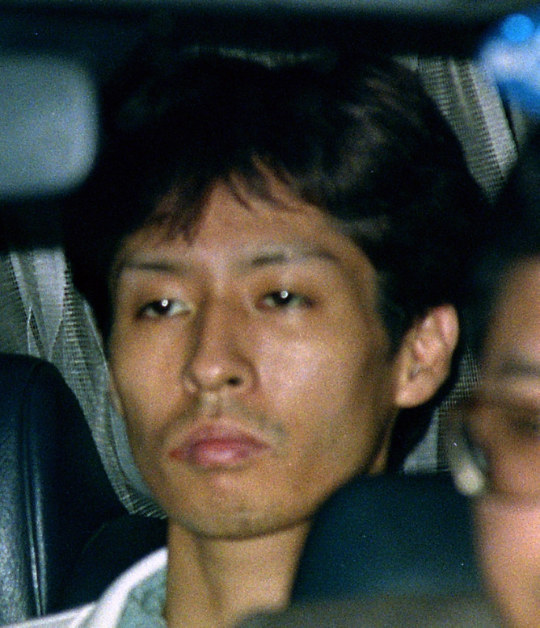
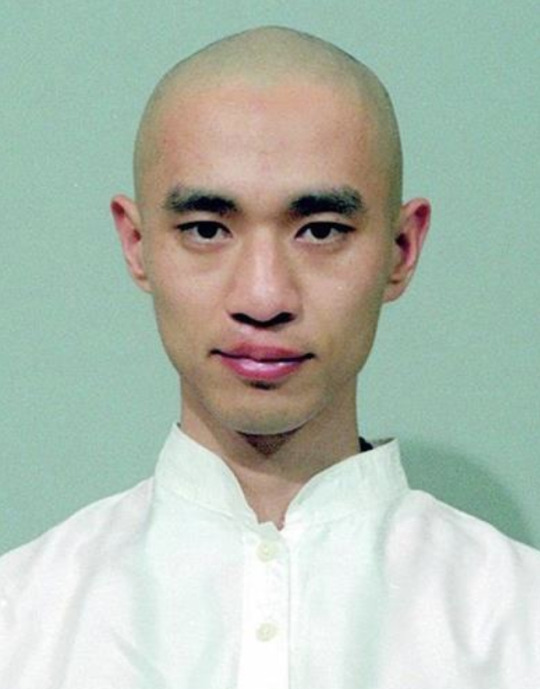
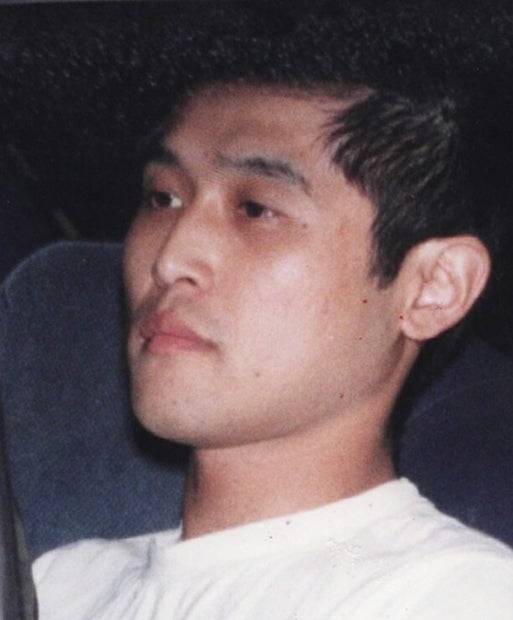
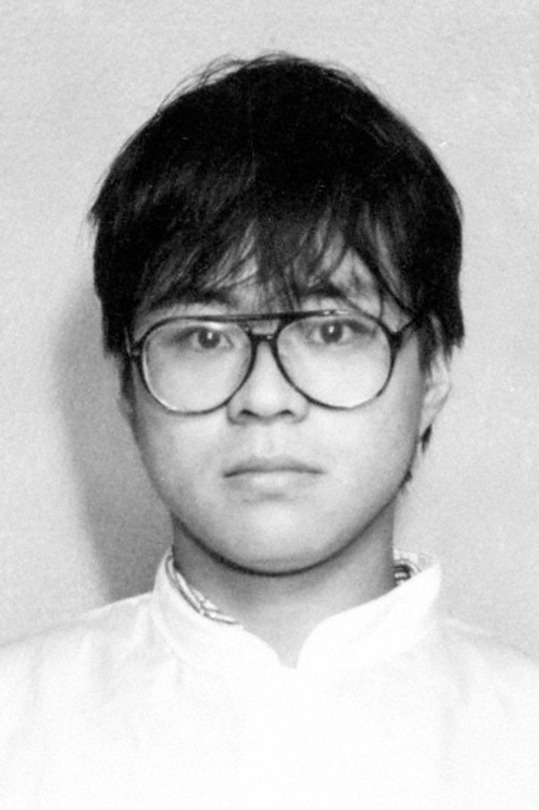
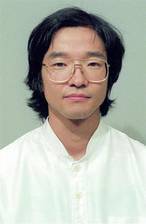
*from left to right
Kiyohide Hayakawa(早川 紀代秀, July 14, 1949 – July 6, 2018)Convicted for his participation in the Sakamoto family murder and several other crimes, Hayakawa was executed on July 6, 2018, at Fukuoka Detention House.
Yoshihiro Inoue(井上嘉浩, December 28, 1969 – July 6, 2018) was responsible for coordinating the Tokyo subway sarin attack in 1995.[3] His holy name was Aananda and his stage in the cult was Master Shogo.
Tomomitsu (新実 智光, 9 March 1964 – 6 July 2018) was an Aum Shinrikyo member convicted for his participation in the Sarin gas attack on the Tokyo subway and a number of other crimes. He was Aum's "minister of internal affairs".
Masami Tsuchiya (土谷 正実, January 6, 1965 – July 6, 2018) was a senior member of Aum Shinrikyo, responsible for the deaths of a combined 19 people and for the production of sarin, VX nerve agent, PCP and LSD.[1] He is also notable for not showing remorse at the trials and remaining loyal to cult leader Shoko Asahara.[1]
Tomomasa Nakagawa (中川 智正, October 25, 1962 - July 6, 2018)
Seiichi Endo (遠藤誠一, 5 June 1960 – 6 July 2018) was an Aum Shinrikyo member who was executed for his participation in the 1995 Tokyo subway sarin attack and a number of other crimes.[1] He was the man who produced the Sarin gas for the attack after leader Shoko Asahara told him to do so.
0 notes